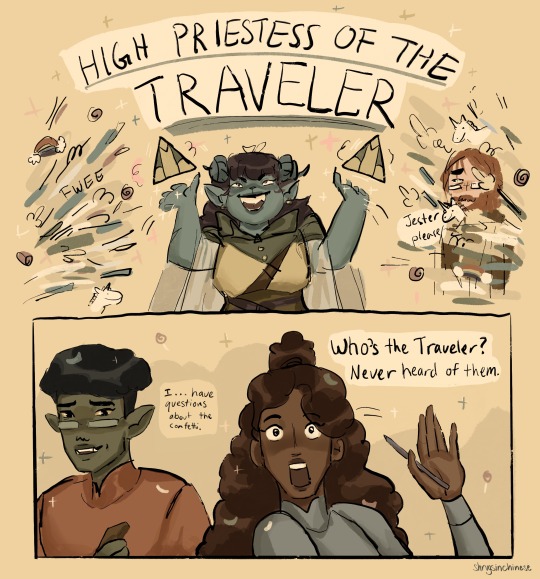#turns out i'm super productive when i'm restricted access from twitter
Photo




Someone called Jester falls down and pops up in Professor Widogast’s class!
...what was the reason for her visit again?
#read left to right#critical role#critical role fanart#caleb widogast#Professor Widogast Series#surprise bet you thought you saw the last of this series#turns out i'm super productive when i'm restricted access from twitter#notes:#i am super out of practice so the pacing is kind of rushed#though if i added any more i wouldve lost motivation#ahhh i missed my student ocs#i have a backstory for each one haha we'll see if anyone wants to know more about them maybe i'll do a little questionnaire for them#the next comic is either a find familiar lesson or beau visiting#also favorite jester noise: ahua ahua ahua
2K notes
·
View notes
Link
It's been just over a year since I sold my company and I'm trying to shake the rust off. It's scary how fast the world changes, especially when building software. But a fresh start is an advantage in a weird way because it lets you pull back and look at trends and where you want to focus your energy. So here are some things I've noticed in the past month just looking around the internet. I'll probably start a business in one of these categories.Curating the curatorsThis is less of a new trend and more one of those exponential curves that is hitting the hockey stick part. There's so much information online that the traditional curators of the past decade are struggling to keep up. For example, Youtube likely has 50-100 videos per category on most popular how-to subjects, so the burden is back on the user to scroll through and make the mental calculations. "Okay this one has more views, but the guy in the thumbnail looks super annoying and is probably going to give a 2-minute intro."There's an opportunity to curate the curators to once again ease the burden on the user. I used to search Product Hunt for new software tools, and now when I search for something simple like "image optimizer" there are 6-7 results I have to consider, which is basically Google. I'd love for someone to tell me the one that they chose after doing the same comparison search I'm about to do. Save me opening another 7 tabs, please.The ProductHunt example is interesting because it seems they've realized they need to evolve their upvote curation method, and recently released a new product called YourStack. This site lets you look at what tools other people are using, which is partially helpful for discovery but still doesn't solve the search problem I looked at above.Whether its Google, Youtube, Product Hunt, or even the people I should be following on Twitter, there's a need for someone to aggregate the best resources from most content platforms.Machine learning as a utilityIt's hard to escape the hype, and I've seen way too many founders start "AI" companies by hiding a very basic algorithm under a bunch of marketing language and a cool .ai domain name.Skepticism aside, my view on the subject shifted when I heard Kevin Kelly talk about AI as a utility. I can't remember the exact quote, but he said that rather than needing everyone to become AI programmers in the years to come, there would be a few algorithms that would be sold like electricity, and every business would integrate them without needing to be experts. He made that prediction about 5 years ago, and we are just now starting to see this take shape in a few limited applications.At its core, a machine learning algorithm helps you do something more accurately by using a large amount of training data. A lot of the early wins in machine learning were low-level tasks that humans did, but could now feed their decisions as training data and build an algorithm around. Examples: moderating content, filtering out graphic material, etc.As for the utility aspect, while you can't get access to the algorithm Facebook uses to auto-moderate posts, there are machine learning APIs available that have the potential to launch many different businesses.In one category, document/image parsing using an API like Google OCR Vision or Docparserrepresents a huge opportunity to replace manual labor in a lot of industries. Let's say I know that bar owners have a stack of liquor vendor invoices that they pay someone to manually type into Excel for accounting. I don't need to be a machine learning expert to build an app that uses a phone camera plus a parsing API to make that much easier.For another example, I have no idea how a tool like Gigapixel AI can turn old photos into high resolution just with their upscaling algorithm, but if they offered an API (and similar tools may already) then I could use it to create a service that helps people update and print their old wedding photos.The opportunity is there, and I'd say you can build on most of these APIs by learning some React/Node.js skills.Goal-based educationI'm a bit biased because my last company was in education, but I also have been closely watching how online education has evolved in the past decade.While the world is full of free courseware and Youtube videos on almost any subject, there's still a huge opportunity emerging to create educational content for a wide variety of purposes and learning styles.One area I'm surprised isn't getting more attention is goal-based training. Related to the signal-to-noise problem with all online content, it's very difficult to piece together the right courses to achieve a specific goal. This was the main principle my last company used to succeed. I taught a course called "How to build a marketplace app like Airbnb" and since many startup founders had marketplace ideas, it connected a path to the goal.To break down another example, let's say I need a place to store my extra books, and I'm feeling adventurous enough to break out the power tools and build a bookshelf myself. Currently, my path looks something like this:Google "how to build a bookshelf"Read a few top articles, try to resolve conflicting informationGo to Youtube and watch a 6-minute bookshelf tutorialWatch another video because the first cut out a lot of stepsTry to resolve conflicting info between those videos and the articles I readGoogle "basics of woodworking"And while it's amazing that we live in an age where all this information is freely available, I'd happily pay for someone to do that work for me and record a "zero to bookshelf" course. I find it odd that when I search Skillshare and Udemy, there's nothing like this out there. Do I take "Woodworking essentials" and then try it on my own? Who knows.Platform ExtensionsIt's a bit terrifying to build on a platform. In the last decade, countless businesses were killed off overnight as Twitter, Facebook and Instagram restricted their once-open APIs. As a founder, there's nothing scarier than the prospect of waking up and seeing your software is broken and can't be fixed.The industry trend of a less-open internet and more limited API offerings has stopped many from building on top of other business platforms. But the upside is high enough that it's worth asking whether there is a less risky way forward.I'd argue that you don't want to build a business on a massive platform. Any of the social networks mentioned above have enough money and power to make platform decisions with very little regard to the businesses built off them. Instead, I'll be looking at smaller platforms with very engaged audiences.A good model of a platform extension business is Baremetrics. The business was founded on Stripe's platform in 2013. Stripe had emerged as a super simple way to integrate a payments API into an application, but their reporting features were lacking. Baremetrics took their reporting data, built it into a dashboard tailored for subscription-revenue, and grew into a respectable platform company. 7 years later, it's far from dead, even though Stripe's reporting capabilities have grown significantly.To replicate this, start off by finding a piece of software you are using/passionate about that has a decently large community (bonus points if they already have an API). It's easy to figure out what the community is asking for as far as features/extensions, and if you build it you know where to find users. Another benefit of a smaller platform is that you can reach out directly to the team. "Hey, love using X, was thinking about building something to help users do Y better. Thoughts?" That way you can get a heads up if that feature/extension is on their roadmap, or if they have no plans to build in that direction. Or, worst case, just say "please don't do that."Those four areas are where I'll be focusing my efforts building software this year, and now comes the hard part: actually doing it. Would love to hear where you're focusing and if you're building in one of the areas highlighted above, how's it going?
0 notes